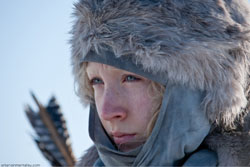There’s one thing you should know about Hanna—she’s got pierced ears.
This girl, who snaps necks and sheds blood like it’s her job, who was raised by her father (Eric Bana) in a remote cabin just below the Arctic Circle, who was trained by dear old dad in God knows how many languages and fighting styles but has never seen a television, heard music, or used the Internet, apparently found time to throw on a pair of earrings in between hunting elk and outrunning a ruthless bunch of assassins led by CIA handler Marissa Wiegler (Cate Blanchett).
Hanna opens with the title character (Saoirse Ronan) questioning her spartan lifestyle, but her father soon gives her a choice: if she turns on a signal beacon in the cabin, she will leave—and face the people who want her dead. She flips the switch on the years-old device, immediately gets captured, and then, after a prolonged escape plan, breaks out of an underground complex in the Moroccan desert.
The contrast of her situation is obvious; Hanna is supposed to be a girl raised outside of our world. Sure, she wears that familiar tough-girl look that screams, “I am a raging bitch.” But she’s not—Ronan plays the character blithe and wide-eyed to the world around her, charmingly excited about all those normal teenage things she’s missed, like befriending a girl her age (Jessica Barden) or riding a motorcycle for the first time.

Then, as more nasty bits about off-the-book CIA operations and her father’s murky past emerge, an icy mask glazes over Hanna’s face. She’s on her own and she doesn’t want to hurt anybody anymore. She wants to avoid her prescribed destiny, but can’t seem to stop dispatching baddies.
Thankfully, the deeds are done in graceful, meticulous scenes that seem to react against the shaky camerawork and disjointed cuts championed by The Bourne Identity and just about every other action movie released since. The shakes inevitably seep in, but are overpowered by long tracking shots that follow sequences of ass-kickings across bleak urban scenery. Wright is a bit obsessed with this shot (it most memorably appeared in Atonement, when he first worked with Ronan) and the way he brags with it is warranted—it looks great set to the Chemical Brothers’ thumping, bass-heavy score.
But beyond the camerawork, Hanna really gets interesting when our heroine has no villains to immediately conquer. Below the surface, Hanna has fairy tale sensibilities—her dead mother and yearning for the outside world suggest a story fit for a Disney princess, not a killing machine. (She even hides a copy of Grimm’s Fairy Tales under her pillow.) If she could only vanquish the evil witch once and for all, she’d live happily ever after with daddy.
But Hanna doesn’t live in that kind of fairy tale. She has to run and punch and maim her way to freedom. When she cries, she’s faking. When she kills, she doesn’t flinch. And sadly, she never comes of age. The perfect soldier doesn’t change.
Except, apparently, for a piercing or two.





just recognized the author/film connection:
\Heller is a rogue asset. I propose we go in and pull him out\